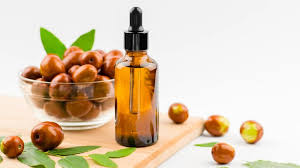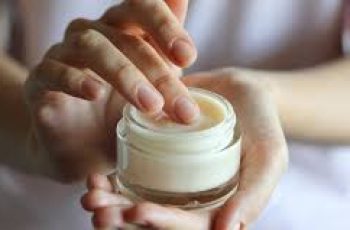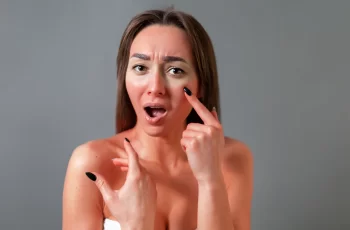Jojoba Oil in Skin Care
Jojoba oil, pronounced (ho-ho-ba), is a commonly used ingredient in skin care products with many skin and hair benefits.
It can be used on the face, body, and hair as a part of your daily skin care routine, and has been used for centuries. Find out why its increasingly common to see jojoba oil in skin care!
sis.
Girls washing their faces
Jojoba oil for common skin conditions
Jojoba oil contains many universally beneficial qualities for skin care, and is used to treat a variety of the most common skin conditions.
There are jojoba oil products designed for the treatment of wrinkles, some kinds of hyperpigmentation, and acne.
Jojoba oil for oily skin
As an anti-microbial ingredient, jojoba oil can help eliminate acne causing bacteria on the skin. (3)
Unlike some oils, jojoba oil is non-comedogenic; this means it does not itself clog pores on skin.
The anti-inflammatory properties of jojoba oil also decrease redness and irritation on clogged pores.These are some of my favorite products for oily skin that contain jojoba oil:
Is jojoba oil used to treat wrinkles?
As both an antioxidant and an anti-inflammatory ingredient, jojoba oil is used in a number of anti-aging skin care products.
Using jojoba oil alongside other anti-aging ingredients can eventually result in fewer wrinkles on the skin.
Because of those properties, jojoba oil is commonly used alongside retinoids in anti-aging products.
It can take months for anti-aging regimens to make significant differences in your wrinkles.
₫
₫
See Product
For skin lightening
Jojoba oil is often found as an ingredient in skin lightening products, however it does not actually lighten skin on its own.
It is not itself a tyrosinase inhibitor nor a PAR-2 blocker.
Multiple products designed for rosacea, melasma, and PIH contain jojoba oil.
Jojoba oil does have a tiny concentration of unsaturated fatty acids, which are tyrosinase inhibitors, but far weaker than is required to actively inhibit melanin production.
For skin lightening, jojoba oil is best used alongside tyrosinase inhibitors like hexylresorcinol, or PAR-2 blockers like niacinamide.
Some great exfoliators with jojoba oil I recommend for treating dark spots are:
Does jojoba oil help hair grow?
Jojoba oil has been used for improving hair growth across the world for centuries, and many people believe it is among the best oils for this purpose.(5)
One study showed that jojoba oil and some other herbal oils were effective in treating alopecia, or hair loss. (9)
Despite these claims, jojoba oil is not super common in hair care products, as some other oils like coconut oil are more effective in hair care.
is jojoba organic?
Is jojoba oil organic?
Jojoba oil is most often harvested and processed organically for use in skin care. (7)
Processing oils under repeated pressurization, chemical treatments, or heating can destroy the fatty acid composition of those oils.
As jojoba oils have extremely beneficial and unique fatty acid compositions, it is often found in its unrefined “golden” form.
White jojoba oil is not organic.
Organic jojoba oil is a gold color.
What is “golden jojoba oil?”
Golden jojoba oil is another name for unrefined jojoba oil; when extracted it holds a golden, almost honey-like color.
Golden jojoba oil is not a different product than regular jojoba oil.
When refined through multiple pressing, heating, and chemical processes, jojoba oil turns white.
What kind of oil is jojoba oil?
It is a pressed plant extract, like essential oils are.
Jojoba oil is often called an oil because it is a transparent liquid, but really it more correctly classified as a wax because it is primarily composed of wax ester that resembles sebum produced by human skin. (3)
Wax esters are not triglycerides (fatty compounds found almost universally in oils).
Wax esters are dense saturated fatty acids combined with fatty alcohols that give jojoba oil a distinct smooth texture which is very desirable in skin care products.
Jojoba oil is the only plant species in skin care recognized to produce a liquid wax.
Jojoba oils function somewhat like saturated fats in their occlusive nature and texture, but technically wax esters are a unique category of fatty compounds.(6)
Which fatty acids make up jojoba oil?
Jojoba oil is 98% composed of a natural wax compound called wax esters, which are fatty acids combined with fatty alcohols.
Though mostly composed of these wax esters, there are also some active fatty acids in jojoba oil: (12)
Eicosenoic acid (73.4%)
Erusic acid (14.7%)
Oleic acid (8.3%)
Oleic acid creates tiny perforations in the skin barrier that helps certain ingredients absorb faster into the skin, but it only comprises 8% of jojoba oil’s fatty acid content so this is not a concern.
The concentration of erusic acid in jojoba oil helps it heal wounds. (1)
is jojoba right for your regimen?
Are jojoba oil products right for your skin?
Jojoba oil very well might be right for your skin; it has tons of beneficial properties and very few drawbacks, if any.
That being said, not every product is right for everyone’s skin, so take be sure to shop by your Baumann Skin Type to make sure you only use what’s best for your custom skin care regimen.
DQH Knowledge drop: In your 20s, your skin cell turnover decreases. (Cell turnover is a key component in keeping your skin youthful.) You know what else slows down? Your collagen production. Starting in your 20s, collagen decreases by about 1 percent per year. Should you want to prevent fine lines and wrinkles, start by eliminating behaviors that contribute to premature aging. “If it’s bad for you, it’s bad for your skin,” says dermatologist Michel Somenek.
“Cigarette smoking reduces blood flow to the skin and causes premature wrinkling and a dull skin texture. Making the repeated pursed motion to inhale can also cause smoker’s lines. Alcohol and recreational drugs are toxins for the skin that damage its cellular structure and DNA,” Somenek tells us. “The faster you eliminate vices while you are young, the better chance your skin and body have to recuperate.” Also, adopting an anti-aging routine in your 20s is key. After all, the best offense is a good defense. We spoke to Somenek and experts Joshua Ross and Audrey Kunin to find out more.
Keep reading for the best anti-aging products for your 20s, according to skincare professionals.
Sunscreen
“We all know that the sun is the number one cause of skin aging and starting the prevention in your 20s is very important,” Ross says. “The majority of your sun damage won’t start to appear until you’re in your 30s, so don’t wait until you see it surface or you’ll be behind the curve. Stay ahead of it with a good-quality zinc-based sunscreen worn daily.”
Farmacy Green Defense Daily Mineral Sunscreen
An invisible sunscreen with SPF 30, plus botanical extracts meant to protect skin with tons of antioxidants. Bonus: It’s clean and fine to use under makeup.
Bareminerals Complexion Rescue™ Tinted Moisturizer Broad Spectrum SPF 30
Although we recommend you use your SPF and moisturizer separately, we also understand moments when you don’t have time or energy for that extra step. For those times, this bareMinerals moisturizer is a great thing to have on hand.
Vitamin C Serum
“A great introduction to anti-aging is to start with a vitamin C serum in your morning skincare routine,” Ross says. “It’s a powerful antioxidant that will neutralize free radicals and brighten the skin.” He adds that it’s a great way to counteract the effects of the sun’s harmful rays, which, as previously mentioned, are among the biggest causes of premature aging.
Drunk Elephant C-Firma™ Vitamin C Day Serum
The Drunk Elephant C-Firma is a lightweight serum that promises to give skin a glow by combining the brightening powers of vitamin C with ferulic acid, l-ascorbic acid, and vitamin E. The included sodium hyaluronate is meant to replace hydration loss, so you shouldn’t have to deal with any irritation.
Sunday Riley C.E.O. Rapid Flash Brightening Serum
This potent serum is jam-packed with vitamin C (15 percent, to be exact), which means it’s a potential superstar at both brightening skin and dousing it in antioxidants.
Peptides
Using peptides on your skin has many benefits, says Somenek. “The skin barrier is what defends the body against pollution, UV rays, bacteria, and toxins. It can be damaged by several everyday factors. Using topical peptides aids in building a stronger barrier,” he says. “Peptides comprise elastic fibers, which are a type of protein. These fibers help to make skin appear taut and firm. Peptides can also help repair damaged skin, relieve inflammation, and even out skin tone. Some peptides can kill acne-causing bacteria that is common in 20-somethings.”
Kunin agrees, saying, “Peptides are an excellent entry point for supporting collagen.” She recommends looking for face and eye treatments that contain these collagen-boosting powerhouses.
Charlotte Tilbury Magic Eye Rescue Cream
This Charlotte Tilbury super-emollient eye cream has a base of coconut oil and shea butter (read: it’s incredibly hydrating). Botanicals plus peptides are meant to help reduce dark circles and boost collagen, respectively.
This creamy moisturizer serves up potent collagen-boosting peptides and pycnogenol, and antioxidant-rich vitamin C. “Instead of sitting on top of the skin, peptides penetrate the outer layer so they go deep. The ‘signals’ they send tell the cells to produce elastin and collagen, which are needed for youthful-looking skin,” explains Somenek.
At-Home Peel Pads
Remember that skin cell turnover fiasco we talked about earlier? One way to help support it is by exfoliating. “Exfoliation is important to help keep skin fresh and luminous,” Kunin says. She recommends using at-home peel pads as an easy and effective way to exfoliate.
“The goal in your 20s is to fight the slowing pace of cell turnover. It is wise to use products that gently exfoliate, yet still remove oil and other impurities. Products that have Alpha Hydroxy Acids (AHA) or Beta Hydroxy Acids (BHA) are a good choice.”
According to Somenek, you should only exfoliate two to three times a week. “People of all ages are guilty of over-exfoliating and that can be too much of a good thing,” he says.
Dermadoctor Kakadu C Intensive Vitamin C Peel Pad
A few swipes of this Derma Doctor powerful peel pad promise to leave your skin glowing and smooth, thanks to the seven (yes, seven) types of chemical exfoliants, including AHA and BHA. It also contains vitamin C via Kakadu plum extract for added brightening and antioxidant protection.
KEY INGREDIENTS Kakadu plum extract is sourced from the Kakadu plum, a fruit grown in northern Australia. It contains vitamin C, which restores the skin’s natural barrier, increases collagen production, and soothes irritation.
Dr. Dennis Gross Skincare Alpha Beta® Universal Daily Peel Pads
These are the gold standard of peel pads, with a cult following and over 900 five-star reviews on Sephora. They’re easy to use and contain a blend of anti-aging exfoliating acids.
Emollient Night Cream
“In your 20s, you need to start upping the hydration in your skincare routine. You may have been cautious of over-moisturizing because of acne in your teens, but as you enter your 20s, your skin transitions and becomes drier,” Ross says. “I recommend an emollient night cream added into your evening skincare regimen.”
“Twenty-somethings need to make sure that they are not using creams that will clog their pores and cause excess oil production,” says Somenek. Opt for non-comedogenic products.
Cerave Skin Renewing Night Cream
One great choice is the CeraVe Skin Renewing Night Cream, which is a non-comedogenic night cream that leaves skin soft and glowy. It combines the moisturizing powers of ceramides and hyaluronic acid.
RoC Retinol Correxion Max Hydration Creme
“The best night cream ingredients contain retinol, benzoyl peroxide, and/or salicylic acid or hyaluronic acid. The goal is to moisturize, yet remove excess oil,” says Somenek. This Roc Retinol Correxion cream fits the bill as it contains both hyaluronic acid and retinol so it promises to moisturize while also being non-comedogenic.



